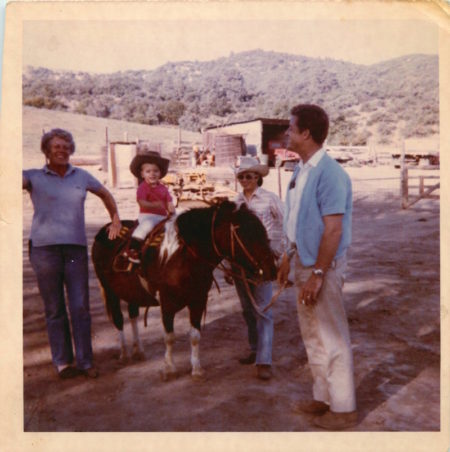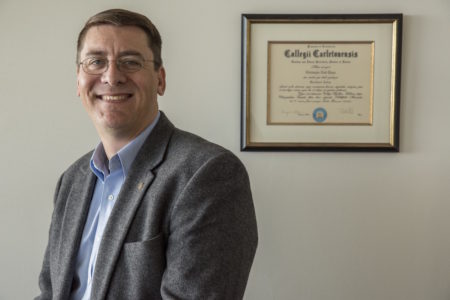By Theresa Duque
While growing up in Fresno, California, Lab researcher Christopher Payne dreamt of becoming a particle physicist.
But as the only child of a single mother with a limited income, he wasn’t sure how he would pay for college. Payne thought he’d have to put his scientific pursuits on hold until one afternoon, during his sophomore year of high school, he received a letter from Carleton College, a liberal arts school in Northfield, Minnesota. He had never heard of Carleton, but the message was clear: They would guarantee the financial support of any admitted student.
For Payne, that level of commitment to a student body seemed too good to be true. At his high school, dropping out was common; less than half of an entering class would graduate. “I knew few teachers who cared to make a difference,” he says.
Mentoring to Give Back
His first year at Carleton opened his eyes to how educators can steer a young person’s career. “I didn’t know what office hours were for,” Payne says. “Having professors who actually cared about me was something I had never experienced before. I thought, ‘Maybe I should work harder in this class!’”
Payne went on to earn a Ph.D. from the University of Delaware in Urban Affairs and Public Policy, and he now heads the Buildings and Industrial Applications Department in the Energy Technologies Area. It’s been over 25 years since he graduated from Carleton with a bachelor’s degree in physics, but his formative years there continue to influence him and are especially apparent in his approach to mentoring.
Since December 2015, Payne has mentored students participating in Carleton’s externship program, which gives undergrads a chance to shadow alums at their full-time jobs. “Carleton was important for me, and this is my chance to give back,” he says. “I want to show these students that their liberal arts degrees can prepare them for a career in the Department of Energy national lab system.”
It also gives him a chance to show Lab staff that liberal arts students can make good scientists, engineers, and employees, he adds.
Building a Better STEM Pipeline
Payne, who is of Cherokee descent, is also committed to forging ties between the Lab and up-and-coming scientists from the Native American community. “I think that diversity is important,” he says. “I have a successful career in STEM because my professors at Carleton believed in me. It’s important for me to give back by mentoring students who want to pursue their dreams but aren’t sure how to start.”

An old family photo of Christopher Payne (seated on pony) with his grandmother, father, and a family friend.
As a child in California’s Central Valley, he was always aware of his Native American heritage, even though most people assumed he was white. He traces his sense of identity to his father and grandparents, who raised him on stories about his great-aunt’s forced migration from North Carolina to Oklahoma on the Trail of Tears, and what it was like for them growing up on an Oklahoma reservation.
Payne also credits the Fresno Unified School District for identifying him as Native American early on and recognizing indigenous peoples during cultural field trips. “I would get pulled out of school to go look at grinding rocks in Yosemite,” he recalls. “My family’s tribe isn’t from Yosemite, but looking back, it at least said that there’s something about being Native American that’s important.”
As his division’s alternate diversity representative to the Lab’s Diversity & Inclusion Council, Payne reaches out to Native American STEM students through conferences and scholarship committees. For a second year in a row, he participated as an AISES (American Indian Science and Engineering Society) scholarship application reviewer.
Last year, through the Lab’s Ambassador Program, he represented the Lab at the SACNAS (Society for Advancing Chicanos/Hispanics & Native Americans in Science) National Diversity in STEM Conference. SACNAS is a society of scientists dedicated to fostering the success of Hispanic/Chicano and Native American scientists—from college students to professionals—to attain advanced degrees, careers, and positions of leadership.
“SACNAS provides us an important opportunity to connect with one of the most underrepresented minorities, especially in science,” he says. “I met incredibly high-caliber science students there from top universities—Princeton, Harvard, Chicago, Johns Hopkins—who hadn’t heard of Berkeley Lab. If we can develop a pipeline of people who are aware of and engaged with Berkeley Lab, that can pay dividends in the future. It’s not about doing them a favor. It’s about making our science better.”


Chris is my direct supervisor. It might seem a bit obvious that I would comment on an article about him, or that my take would be altogether positive and reverential. But Chris does live his beliefs. His commitment to the ideal that the expansion of opportunity to all segments of society is both a good onto itself as well as being a good to the scientific enterprise is one that he continually stresses. He is constantly thinking through not just the ways in which these opportunities may be further explored (I should know, as a co-representative on the Diversity & Inclusion Council), but is similarly concerned about how to ensure that those under his supervision feel supported, validated and encouraged to do their best work (the inclusion side of the equation). Professionally and personally, he lives as a calm source of inspiration. It is a privilege to work with him.
Very enjoyable article!